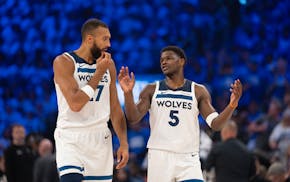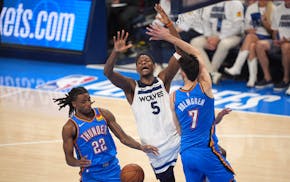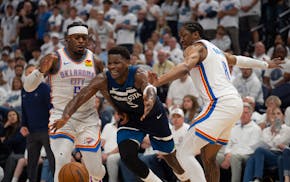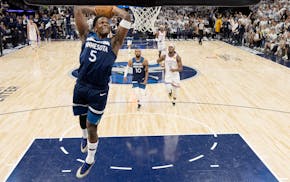Some years, Kayla McBride earns MVP votes.
Some years, she earns votes for no awards at all.
Some years, she is an All-Star. Other years, she doesn't come close.
The veteran Lynx guard is capable of being a skilled, gritty, two-way dynamo with a quick-release three-point shot.
She's also capable of receding into the background like a bicyclist who just parked and removed their neon vest.
Sunday, the Lynx lost Game 2 of the WNBA Finals 80-66.
Their star, Napheesa Collier, had a remarkable seven turnovers. The Lynx were again outrebounded by a much larger front line.
Their offense skidded to a halt as they scored just 27 points in the second half, an astounding failure for a team that made it this far largely because of efficient passing and shooting, and that led the WNBA in three-point shooting percentage.
As Lynx coach Cheryl Reeve said via a teleconference from New York, "I think the opponent has a fair amount to do with it." The Lynx were playing what New York had to consider a must-win game at Barclays Center, and the Liberty were the best team in the league this year.
That's why the Lynx so desperately needed a powerhouse performance from McBride, their most experienced player.
When she's at her best, she is a prototypical three-and-D player, capable of winning possessions in a big way on both ends.
Sunday, she was not at her best. McBride finished with eight points in 33 minutes. She made three of nine shots from the field, with zero attempted free throws. She finished with one rebound, one assist and zero steals or blocks.
McBride's resume says she should be the Lynx's second-best player, and she was the one Lynx player who joined Collier at this year's All-Star Game.
Sunday, when New York forced the action, McBride played well below her capabilities, and her lack of contribution in terms of "hustle stats" — rebounds, steals and blocks — proved telling.
The Lynx have played nine postseason games this season. In their six victories, McBride has averaged 16.7 points while making 45% of her shots. In their three losses, she has averaged 8.3 points while making 38% of her shots.
McBride isn't known as a pure playmaker, but she has contributed heavily to the ball movement that made the Lynx an offensive power this season. Sunday, she had one assist. In her first eight postseason games this season, she averaged more than four assists per game.
Whether McBride's performance was an indicator that the Lynx need more from her to win, or just a byproduct of a poor team performance in the face of a New York onslaught, the Lynx need more from her if they're going to win their first title since 2017.
McBride arrived as part of the Lynx's first aggressive push into free agency. Reeve signed McBride, Aerial Powers and Natalie Achonwa to keep the Lynx competing for titles even after the loss of five Hall of Fame-caliber players.
Powers wound up on the bench, proving as embarrassing to the franchise as it was to her. Achonwa contributed little. McBride was the keeper because of her shooting skill, physical and mental toughness and willingness to take hard coaching and to play well alongside Collier, the franchise player.
Speaking of her team in general, Reeve said: "Our pace was slow, taking too long to get into things. And, you know, I don't think we were terribly hard to play against."
Because of her experience, and the respect she commands from her teammates, McBride could have made a difference in the way her team played.
And she probably will, in Game 3. McBride hasn't scored in single digits in consecutive games since mid-June.
Known for her unselfishness, McBride has been an ideal member of the most surprising team in the WNBA in many years.
For that team to win a title, McBride will have to be more neon than invisible.

Souhan: If Edwards is a franchise player, he needs to act and play like it

Souhan: Wolves' weak performance in Game 5 invites change, so don't let it shock you

Souhan: Edwards and Randle flop in the Timberwolves' biggest game of the season

Souhan: Twins' Baldelli and Timberwolves' Finch have a lot in common. They ought to talk.


